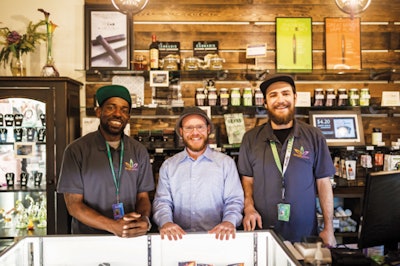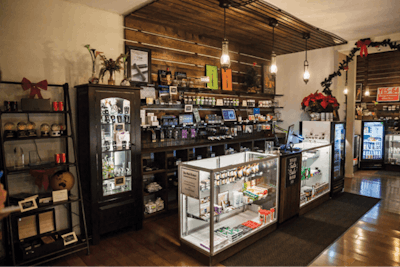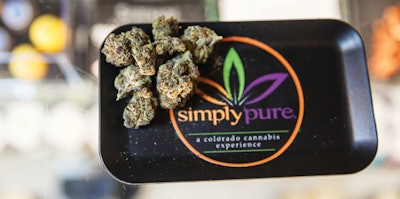
Editor's note: Wanda James is expanding the Simply Pure brand she founded to New Jersey through a partnership with Tahir Johnson, owner and CEO of Simply Pure Trenton, which is set to launch by the end of 2023. James and Johnson were featured on the November/December 2023 issue of CBT, and detailed the story of how Simply Pure Trenton came to be.
On Dec. 7, 2017, Wanda James was sitting inside the Denver Performing Arts Complex, elbow-to-elbow with some of the cannabis industry’s top players, when her name bellowed from the PA system.
She had just won the Lifetime Achievement Award for her work in the industry.
James walked to the stage in her mid-length white dress, took her place at the lectern and, with her curly black hair resting on her shoulders and her husband standing behind her, she belted out her acceptance speech. But don’t ask her to repeat it.
“I think I asked for a dab, and then after that I don’t really remember what I said,” James says, laughing. “But hopefully I thanked all the folks that got us here.”
James wasn’t expecting the award. Jokingly, she says she is too young to receive a Lifetime Achievement Award. Regardless, the significance of the moment wasn’t lost on her.
“It’s beyond awesome. I didn’t open a dispensary, or start speaking out about mass incarceration and police brutality and equality thinking that one day I was going to get a Lifetime Achievement Award,” James says. “That’s not why you do it. You do it because it matters to you.”
“I didn’t open a dispensary, or start speaking out about mass incarceration and police brutality and equality thinking that one day I was going to get a Lifetime Achievement Award. That’s not why you do it. You do it because it matters to you.” – Wanda James
James and her husband, Scott Durrah, own and operate Simply Pure, a Denver-based, vertically integrated medical and recreational dispensary with three cultivation centers. Located at the corner of Tejon Street and West 32nd Avenue in Denver’s LoHi neighborhood, Simply Pure benefits from being in the heart of one of the city’s trendiest and fastest-growing areas. The location, combined with Simply Pure’s carefully curated product selection, has made the dispensary particularly popular among tourists. Simply Pure General Manager Brian Nowak estimates that “60 to 70 percent of our customers are tourists,” and says the shop serves roughly 150 customers daily.
According to Nowak, the dispensary has 390 SKUs. It carries established brands such as Pax, O.Pen, Coda, Wana, 1906, Stillwater and Stratos. James estimates that Simply Pure works with 40 different vendors for non-flower products. But being placed on Simply Pure’s shelves isn’t easy. “It’s not just about the quality. You can have the best product in the world, but if you don’t know how to market and sell it, that doesn’t work for us,” Nowak says, adding, “Those companies stuck in 2009 using at-home labels on a standard container, that is not going to cut it.”
Vendors must participate in the marketing of their products at Simply Pure. They are required to commit to a certain number of vendor days (where growers and processors interact with customers in the dispensary), promote the dispensary on their social media pages and train Simply Pure’s budologists (budtenders) on their products.
In addition, says James, “We partner with people that have the same beliefs that we do in terms of processing and purity.” For flower, Simply Pure typically only sells its own; however, James states that the company works with four third-party growers that it “implicitly trusts.”
Like most dispensaries, though, Simply Pure was not an overnight success. It took James and Durrah several iterations to make Simply Pure exactly as they wanted. But to understand how James got to where she is today, you have to understand where she came from.

FROM THE TOP
James was “born a poor black kid” to a British mother and American military father. The typical Air Force brat, she spent time growing up in Germany, England and Italy. She attended the University of Colorado, Boulder, where she was part of the Naval ROTC. Upon graduating, James became a commissioned officer in the U.S. Navy where she worked in Integrated Undersea Surveillance System (IUSS) hunting submarines. “If you ever saw [the movie] ‘Red October,’ that was based on everything we did,” James says.
In 1991, at age 26, James left the military after completing her tour and moved to Los Angeles where she took her “first job in Corporate America” before becoming director of marketing and sales for Southern California Presbyterian Homes (now known as be.group).
This is also around the time James met Durrah—a professional chef, a former Marine and currently Simply Pure’s chief operating officer (COO). When they were 32, the veteran couple opened their first restaurant, The Jamaican Café, in Santa Monica, Calif., and they have owned restaurants ever since.

In 2001, James ran for a House seat in California’s 32nd District. Despite her bid being unsuccessful, the experience energized her to jump further into politics. Later, she managed two congressional campaigns and was eventually appointed to Barack Obama’s National Finance Committee, and Colorado Gov. John Hickenlooper’s Amendment 64 Task Force Work Groups.
“Politics is important to me,” James says. “My brother was arrested for cannabis at age 19 with four and a half ounces of cannabis. [He] did 10 years in the system in Texas.” James was surprised to discover people were actually jailed for cannabis possession because in the “very white world” in which she existed while at the University of Colorado, she had never seen anyone arrested for marijuana. “So, it was shocking to me to start finding out [that] people were arrested for simple possession, and [that most] of [them] were black or brown,” James says. (According to the American Civil Liberties Union, 88 percent of the 8.2 million marijuana arrests between 2001 and 2010 were for possession, and African Americans are nearly four times more likely to be arrested for marijuana than white people.)
“Business owners [must] start talking like business owners and sharing our successes and our challenges so that we can make things more positive. Making it difficult for other business owners to get into this industry is not helping the people in this industry.”
– Wanda James
TRANSITIONING TO CANNABIS
Motivated by her brother’s arrest, the number of minorities incarcerated for possession and a desire to make a difference, James moved back to Colorado in 2004. In 2008, “Barack Obama was elected, and [Scott and I] decided to open a dispensary as a political statement,” James says. “Let me be frank: It was also good business.”
James and Durrah felt confident entering the cannabis space because they knew they had nothing to hide. As former Naval and Marine officers, both had been well-vetted for most of their lives. “So, we went headfirst into this cannabis industry,” she says. “We’ve been outspoken since the very beginning.” She remains that way to this day, dubbing Simply Pure “America’s Political Dispensary.”
When they opened their first dispensary, Apothecary of Colorado, in 2009, they were the first African Americans in Colorado licensed to own a dispensary, a grow operation and an edibles company. Durrah’s culinary background helped them specialize in edibles, which he concocted himself. One fourth of the dispensary was designated as “The Gourmet Shop” and featured his products. “Forty-five percent of our sales were edibles,” James recalls.
However, they noticed other edible manufacturers weren’t using satisfactory quality assurance (QA) procedures because, at that time, as James says, “There were no rules. We were concerned about how poorly edibles were being made. They were being made in people’s homes with no cleanliness.” Being from the restaurant industry, this was unacceptable to James and Durrah. So, they sold their dispensary and worked full-time with the State of Colorado to help craft the state’s rules for manufacturing edibles.

In 2010, James and Durrah returned to the scene and opened Simply Pure Edibles.
Simply Pure Edibles produced vegan, gluten-free, organic products. Unfortunately, James and Durrah were making them when the bottom fell out of the medical marijuana market. James recalls: “Edibles were being made for $3 and sold for $1.” In 2012, James again decided to shutter the business “before [it] got in any kind of [financial] trouble, and we just decided to reopen once [adult-use] legalization passed.”
THIRD TIME’S THE CHARM
Three years later, in September 2015, Simply Pure reopened at its current location as a medical dispensary. (It began serving adult-use customers in December 2015.) After all her perseverance and resilience, James finally had the dispensary she always dreamed of. This one was here to stay.
On the outside, the building is inconspicuous other than a mural depicting the Rocky Mountains, various Denver attractions and Simply Pure’s logo. James commissioned the mural, but not solely for aesthetic purposes. “In Colorado, we can’t have any kind of billboards or advertising … so the mural helps with that,” she says.

Despite previously opening a dispensary and an edibles company, James still encountered difficulties when launching the third iteration of Simply Pure. As could be assumed given the industry, finances were a major obstacle for James. “Finance in this industry is obscene. … How do you make money? How do you stock up your cost of goods? How do you lower your tax rate? How do you find the right financial partners?” she says, going on to stress that it is crucial for dispensary owners to find the right chief financial officer (CFO)—one that “begins to understand cannabis or even wants to understand cannabis.”
James joins many others who have proposed a solution to the industry’s finance woes: “Get rid of 280E. You don’t need to tax at that level,” she says. “Then the federal government needs to back up out of this.” James laments that the federal government is making “a mint” off cannabis sales. IRS tax code 280E was created to take profits from drug dealers, so why it is being applied to legal cannabis businesses, she isn’t sure. “The fact that the government wants to put me in the same boat as ‘Scarface’ really kind of upsets me,” James says. “I have a great big sign. … ‘Scarface’ didn’t have a sign that said, ‘Buy Cocaine Here,’ nor was he registered with the Secretary of State.”
NOTHING IS RANDOM
James wanted Simply Pure to be different than other Denver dispensaries and took her time to make it that way. “This is a ‘Colorado Cannabis Experience,’” James says with pride. And the experience starts when you walk in the door.
Simply Pure has a large, inviting, comfortable lobby that feels like a friend’s living room. “I think there’s a little layer of sophistication,” James says. It has a sturdy wood door, wood floors and light gray walls. An antique chandelier with lantern-style lights suspended from the ceiling by a wrought iron chain illuminates a wall full of magazines and newspapers in which James has appeared. There’s a total of 10, including Ebony and Black Enterprise. A large area rug spans the room, and rustic wooden chairs with metal accents line the walls. The waiting area has seating for six, but can hold many more due to its open floor plan. Reggae music reverberates throughout the lobby.
This relaxed, “Colorado-chic” vibe (as James likes to call it) continues into the product space. Customers and patients are greeted by an open, ambient-lit room with wood floors and wood-paneled walls. Display counters and registers line both sides of the entrance. In the back are two additional displays and registers broken out for medical and recreational customers.
James designed the interior of Simply Pure, saying: “If I’ve done anything extremely well, it’s that I’ve put 30 years of experience into our logo design, into our name and into the look and feel of Simply Pure.” She adds that she had one goal when designing. “If my mom comes in here, she’s going to feel comfortable, and if my 30-year-old brother comes in here, he’s going to feel hip.”

Product layout is also part of Simply Pure’s aesthetic. “There is always a design to everything [we do],” James says. She places all her new products at eye-level near the entrance so customers and patients can easily view them upon entering. Products are grouped together by category for a simpler customer experience, she says.
However, in this industry, James’ love for design is also a hindrance. Simply Pure has several design modifications planned for 2018, but due to state regulations, changing any part of the store’s layout becomes an expensive headache. James wants to relocate a few displays and move all her cash registers to the back to give the store a more retail feel, but she can’t go in after hours and rearrange. “I would have to send a modification request to the state, and when they approve my modification, then I have to send it to the city, then to the fire department,” James says. She would then have to hire someone to reposition all the security cameras. She estimates that these changes will take a minimum of three months due to the approval process alone, and that leaves her with a sour taste. “In a business that’s [around] 1,000 square feet, [the fact that] I can’t move my counters around to make it look fresh in here—that’s annoying,” she says.
But, interior design isn’t only about what customers see; it’s also about what they don’t, and inside Simply Pure they will never see a security guard. “We like the Tiffany-style of security,” James says, referring to the high-end jewelry store, meaning that just because security guards aren’t present, doesn’t mean you aren’t being watched. “I purposely do not want people to come in here and feel like they are doing anything wrong or anything dangerous,” James says.
Instead, each Simply Pure manager has surveillance camera feeds at his or her desk, and there is another surveillance station at reception. “Panic buttons” are located throughout the shop, and the wall that separates the lobby from the dispensary is reinforced.
TEAM PRIDE
Currently, Simply Pure employs 31 people between its dispensary and four cultivation centers. At the end of 2017, the company received its marijuana-infused products (MIP) license and expects to hire an additional 15 to 20 employees in the early months of 2018 to assist with the extra workload.
James takes extreme pride in her staff, and reverts to her Navy days to describe to them. “Our budologists are like Navy SEALs … [SEALs] know they’re the best. They know they know their s---,” James says. “They walk differently. They stand a little taller. … They’re just those people, and our budologists are those people. They care about this stuff.”
The reason for James’ confidence in her staff? Simply Pure’s training program. According to Nowak, each new hire goes through a rigorous, two- to three-week training culminating in a 50-question final exam. New hires must receive a minimum 80-percent grade to work unsupervised on the dispensary floor. Simply Pure also provides mandatory employee training each month on a specific topic, such as cannabinoids or terpenes. “We provide education and training on those topics for the month, and then at our monthly meeting we do a test to make sure everyone is staying up to date,” Nowak says. Staffers must receive a 75 percent or higher to be allowed to continue to work.
Since Simply Pure’s customer base is roughly 65 percent tourists, having a knowledgeable staff is a huge advantage as they are often tasked with explaining products and effects to new cannabis customers. “We want to be able to show you what to expect when you smoke this [joint] that’s high CBD and low THC, as opposed to smoking a vape pen,” James says.
James is so keen on customer interaction that she has been known to spurn technology that would move people through her dispensary faster. James uses an example of a point-of-sale (POS) system that was guaranteed to cut a customer’s transaction time to two minutes. “That’s fascinating, … but right now, I want somebody to be able to spend 20 minutes with my budologists. … That’s what makes Simply Pure different. We stand out because we’re proud of what we do,” James says. “You've got to want to be a part of this industry.” (Simply Pure does have online ordering for those who want that convenience.)
James helps her staff with that initiative by requiring each employee to attend one cannabis event per quarter. This could be a local trade show, vendor day or party. If tickets are required, Simply Pure will usually provide them. James also implores her employees to visit other dispensaries and talk to the employees. In late December, she took her staff to a competing dispensary and spent $350 because, she says, “We wanted to support them. They're doing great things. … I want my GM to know their GM. I want my budologists to know their budologists.”
James feels the entire industry could benefit from this type of open communication. “It is time for dispensary owners to stop being fearful about talking about their businesses because it’s destroying us,” she says. “This industry is so new, and so many people are so fearful that people are going to judge them on their lack of business acumen. Business owners [must] start talking like business owners, and sharing our successes and our challenges so that we can make things more positive. Making it difficult for other business owners to get into this industry is not helping the people in this industry.”

WHAT’S AHEAD
Simply Pure has much planned for 2018, headlined by a proprietary new grow technique. The company also will introduce its Vendor Participation Package (VPP), which James calls a revolutionary initiative to make partners out of brands Simply Pure carries, but she declined to elaborate further.
James is even thinking long term. She provides a few prophecies: In five years, “I see us as a national edible company. You will see Simply Pure products from California to New York to Florida to Texas.
“I believe the CEO of Simply Pure will be a young, fresh, new, talented, phenomenal person in five years; it won’t be me.” If that’s the case, James can rest easy knowing that she gave her all to the industry she loves. Her Lifetime Achievement Award is proof enough of that.



























